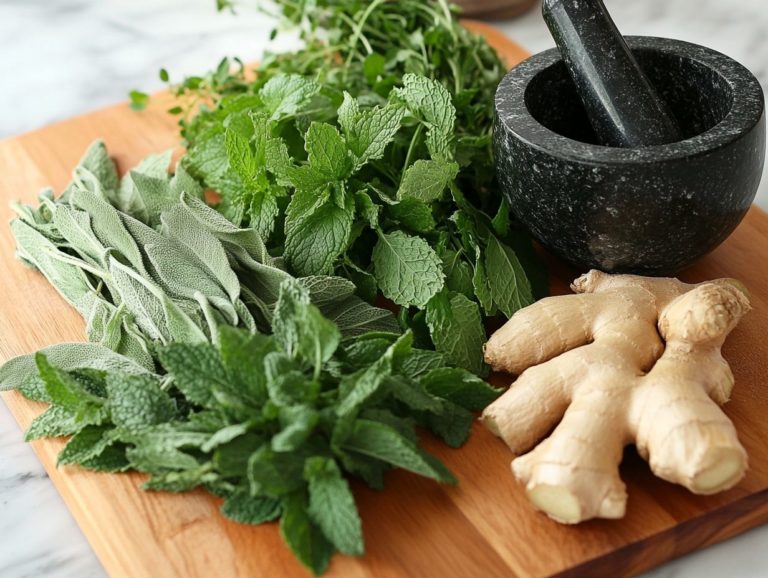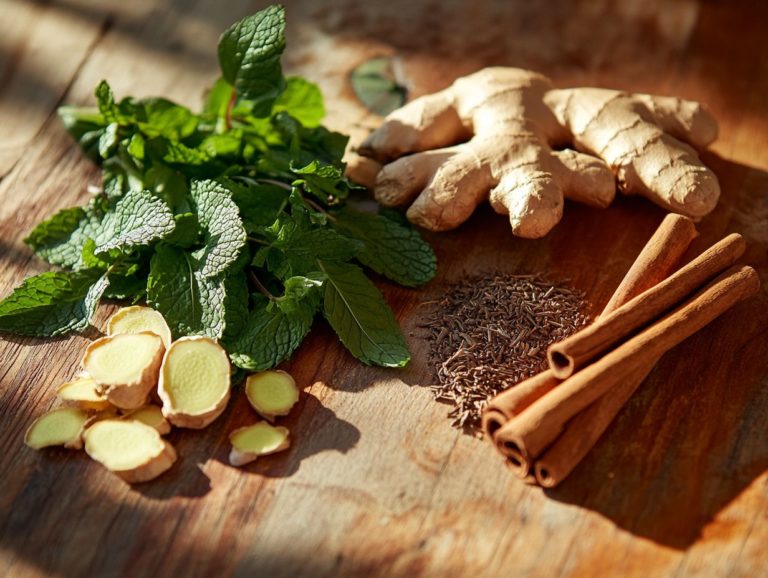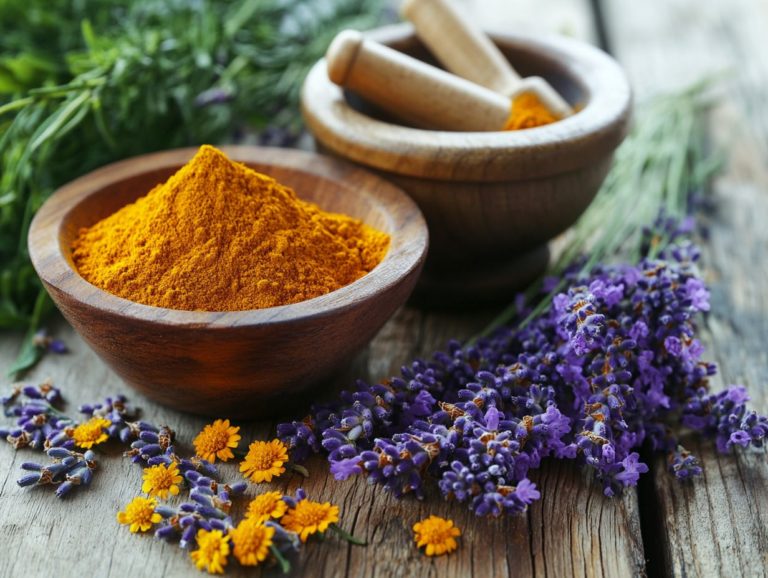5 Herbal Solutions for Skin Conditions
Struggling with skin issues like sunburn, acne, or eczema? You re certainly not alone! The good news is that nature has some remarkable remedies for you, including tea tree oil, garlic, and fenugreek.
This article delves into five herbal solutions Aloe Vera, Tea Tree Oil, Calendula, Turmeric, and Chamomile that can provide relief from various skin conditions, including bacterial infections and dermatitis.
Discover how these natural ingredients can revolutionize your skincare routine! Learn about their potential side effects and tips for seamlessly incorporating them into your herbal skincare regimen.
Dive in to uncover how these herbal solutions can transform your skin!
Contents
- Key Takeaways:
- 1. Aloe Vera for Sunburn Relief
- 2. Tea Tree Oil for Acne Treatment
- 3. Calendula for Eczema Relief
- 4. Turmeric for Psoriasis Management
- 5. Chamomile for Rosacea Soothing
- Discover How Herbal Solutions Can Naturally Enhance Your Skin Health!
- How to Incorporate Herbal Solutions into Your Skincare Routine
- Other Uses of Herbs for Skin Care
- Precautions When Using Herbal Solutions for Skin Conditions
- Frequently Asked Questions
Key Takeaways:

- Aloe vera is a natural remedy for sunburn relief, providing soothing and healing properties for damaged skin.
- Tea tree oil has anti-inflammatory and antibacterial properties, making it effective for treating acne and blemishes.
- Calendula helps manage eczema and soothes irritated skin with its anti-inflammatory and antiseptic qualities.
1. Aloe Vera for Sunburn Relief
Aloe Vera is a remarkable natural remedy celebrated for its sunburn relief. Its exceptional moisturizing properties and skin-healing capabilities alleviate pain and reduce inflammation, making it ideal for burns and wounds.
This versatile plant not only calms irritated skin but also speeds up healing, thanks to its rich array of vitamins and antioxidants. Compared to other natural remedies like coconut oil or shea butter, aloe vera stands out for its concentrated anti-inflammatory agents.
Incorporating aloe vera into your holistic skincare routine enhances the effects of other gentle treatments. It fortifies your skin’s natural barrier and promotes overall health and wellness. By regularly using aloe vera gel, you can achieve a hydrated and resilient complexion. Embrace its benefits, especially during the intense summer heat!
2. Tea Tree Oil for Acne Treatment
Tea tree oil is renowned for its powerful antibacterial properties, making it an effective herbal remedy for acne. It’s a natural alternative to conventional treatments that many seek.
Rich in compounds like terpinen-4-ol, tea tree oil targets the bacteria responsible for acne breakouts. It works to reduce inflammation and promote clearer skin. Apply tea tree oil directly to affected areas after diluting it with a carrier oil a base oil used to dilute essential oils or choose skincare products that incorporate this essential oil.
When compared to remedies like lavender or chamomile, tea tree oil often delivers quicker results due to its robust antibacterial effects. For the best results, mix a few drops into your daily moisturizer or use it as a targeted treatment for blemishes.
Exercise caution, as tea tree oil can sometimes cause skin dryness or redness. Always perform a patch test before use to ensure it s compatible with your skin type and to avoid potential allergic reactions.
Ready to try these herbal solutions? Share your experiences and let us know how they work for you!
3. Calendula for Eczema Relief
Calendula is a well-known herb that effectively relieves eczema and other skin issues. Its soothing properties reduce inflammation and help healing.
The natural compounds in calendula, such as those that help soothe the skin, work wonders in calming irritated skin. This makes it a popular choice for those seeking relief from the discomfort of eczema and dermatitis.
You can apply calendula in several ways. Options include topical creams enriched with calendula extract or homemade herbal oils, like garlic-infused or neem-infused oils, which can be gently massaged into the affected areas for better absorption.
Compared to other natural remedies like chamomile or aloe vera, calendula stands out for eczema relief. Its unique ability to soothe and heal the skin gives it an edge in managing eczema symptoms.
4. Turmeric for Psoriasis Management
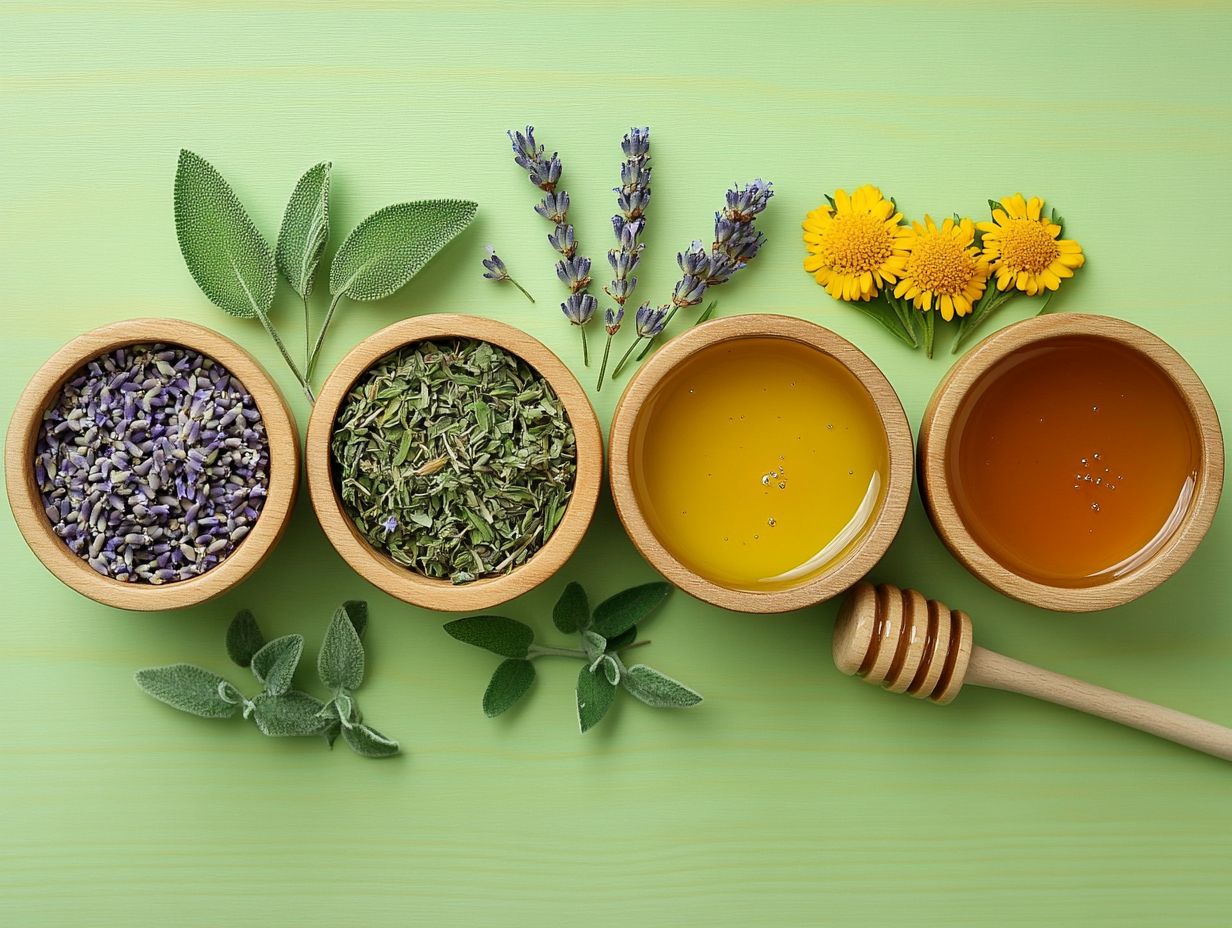
Turmeric is a powerful remedy for managing psoriasis and other skin conditions. Its robust anti-inflammatory properties soothe symptoms and enhance your skin’s overall condition.
This vibrant yellow spice offers various applications. You can choose topical treatments like turmeric-infused oils, dietary adjustments, or supplements for relief from skin problems.
When applied topically, a paste made from turmeric and coconut oil can be gently spread on affected areas, providing targeted benefits and aiding in skin healing.
Incorporating turmeric into your meals think curries and smoothies can also help reduce systemic inflammation. Many people are thrilled with their results, noting remarkable improvements after consistent use.
Research supports these personal accounts, showing that curcumin, the main active ingredient in turmeric, effectively lowers inflammatory markers linked to psoriasis. This bolsters its status as a valuable complement to traditional treatments and enhances skin protection.
5. Chamomile for Rosacea Soothing
Chamomile is renowned for its soothing properties, making it an exceptional remedy for relieving the symptoms of rosacea and minimizing skin irritation, especially for those with sensitive skin.
Its anti-inflammatory qualities calm redness and reduce swelling, providing much-needed relief from irritation. You can prepare chamomile in several forms, such as herbal teas that promote overall skin health and emotional well-being, or topical applications where cooled chamomile tea is gently applied to affected areas.
This gentle approach offers advantages over other remedies like calendula or aloe vera. Chamomile not only alleviates irritation but also enhances your skin’s barrier function, leading to a more resilient and balanced complexion.
By incorporating chamomile into your skincare routine along with other medicinal herbs, you embrace a natural and effective method for managing rosacea flare-ups and improving your skin’s health.
Discover How Herbal Solutions Can Naturally Enhance Your Skin Health!
Utilizing herbal solutions for skin conditions, including natural soaps and homeopathic treatments, presents you with a wealth of benefits. These natural remedies possess healing properties that can effectively address a range of skin issues, from acne to fungal infections, all while enhancing your overall emotional well-being and supporting your immune system.
Many people, like yourself, find solace in nature’s remedies, as certain herbs, including dandelion and neem, can significantly reduce inflammation and redness associated with conditions such as eczema and acne. Take calendula, for example—renowned for its soothing properties, it’s an ideal choice for calming irritated skin and treating dermatitis. Then there’s aloe vera, which not only hydrates but also strengthens your skin’s natural barrier, providing a protective shield against environmental irritants and supporting skin healing. Additionally, you might be interested in exploring 5 traditional herbal remedies you can make for more natural solutions.
Chamomile, with its appreciated anti-inflammatory effects, aids in restoring balance and promoting healing. By adding these DIY herbal treatments for skin irritations into your routine, you can nurture your skin while tapping into the serene essence that nature so generously offers.
How Do These Herbal Solutions Work?
Herbal solutions operate through a range of mechanisms, tapping into the remarkable natural properties of medicinal herbs that possess both antibacterial and antiviral qualities. These herbs contain properties that help promote skin healing and tackle various skin conditions, including skin infections.
For example, the compounds found in tea tree oil, specifically terpinen-4-ol, have demonstrated efficacy in combating acne-causing bacteria and are valuable for treating bacterial infections. Meanwhile, calendula is rich in flavonoids that enhance wound healing and promote skin protection by minimizing inflammation.
Similarly, aloe vera’s polysaccharides are essential for skin hydration and regeneration, aiding in the repair of damaged tissues, expediting the healing process, and providing moisturizing benefits. Resveratrol in Japanese knotweed offers antioxidant properties, helping to combat oxidative stress and further bolster skin health, supporting overall immune system functions.
By harnessing these powerful components, herbal solutions create holistic remedies that not only soothe irritated skin but also empower it to recover more effectively. Discovering 5 common herbs with healing properties can enhance your approach to natural healing.
What Are the Possible Side Effects of Using Herbal Solutions for Skin Conditions?
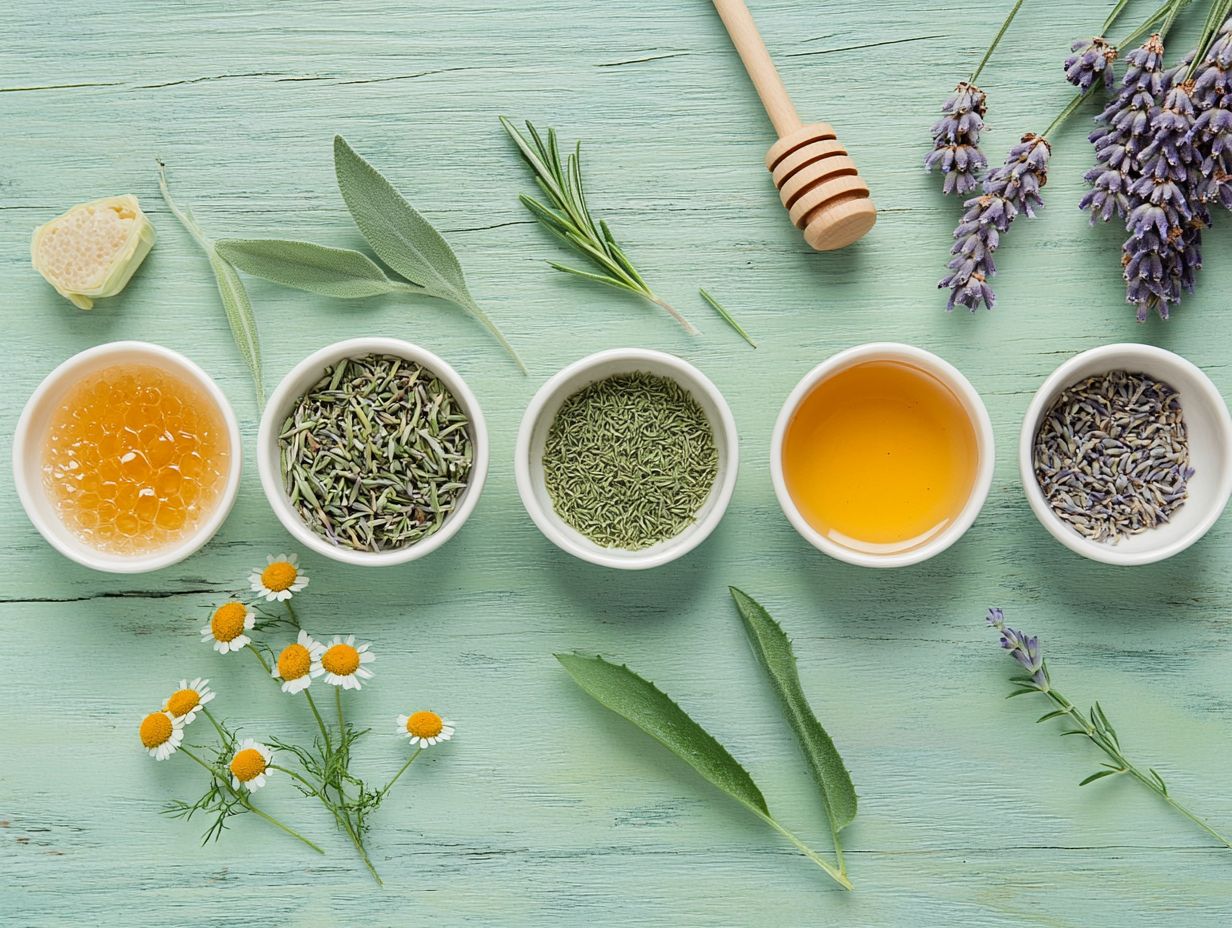
While herbal solutions can be an effective way to tackle skin conditions, it’s crucial for you to consider any potential side effects, such as skin irritation or allergic reactions to certain herbs like garlic or fenugreek.
Stay vigilant, as these reactions may not surface until hours or even days after application, particularly for those using potent herbal remedies. It’s wise to perform a patch test before adding any new herbal product to your skincare routine. Simply apply a small amount of the herbal solution to a discreet area of skin and watch for any adverse reactions, especially if using herbal oils or home remedies. You might also consider exploring 5 herbal teas for better skin health as part of your regimen.
Consult with a healthcare provider now to ensure your herbal choices are safe and effective for your unique skin type and conditions. They can provide tailored advice and help you avoid potential complications that could arise from using an unverified treatment or untested herbal solutions.
In conclusion, by understanding the benefits and potential side effects of herbal solutions, you can make informed choices that enhance your skin health naturally.
How to Incorporate Herbal Solutions into Your Skincare Routine
Incorporating herbal solutions into your skincare routine can truly elevate the health of your skin. Seamlessly integrate natural remedies, gentle soaps, and herbal oils that offer moisturizing benefits.
Ready to craft your own herbal masks at home? A delightful mix of avocados, honey, and chamomile can work wonders to soothe dry skin. For added benefits, consider brewing herbal tea for skin nourishment alongside your masks. When selecting products, look for those infused with botanicals like aloe vera or lavender, which deliver calming effects, especially for sensitive skin.
Establishing a consistent routine is vital. Cleanse your face morning and night, follow up with a toner or a herbal-infused serum, and then apply a moisturizer enriched with plant extracts. By prioritizing these practices, you can learn about herbal remedies for skin conditions to achieve a vibrant and healthy complexion while keeping your skin nourished and balanced.
Other Uses of Herbs for Skin Care
Beyond treating specific skin conditions, various herbs can address numerous skincare needs, offering natural remedies for issues ranging from moisturizing to anti-aging effects.
These botanical treasures enhance your skin’s texture by promoting cell renewal and improving hydration levels. For instance, rosehip and calendula are famous for their soothing properties, effectively calming irritated skin while delivering antibacterial benefits to help prevent infections.
Herbs like chamomile and lavender not only envelop you in a calming aroma but also provide holistic health advantages. They reduce stress and foster overall well-being. When you weave these versatile herbs into your daily routine, they become powerful allies, transforming your skincare regimen into a multi-dimensional experience that nurtures both your skin and emotional balance.
Precautions When Using Herbal Solutions for Skin Conditions
Ready to explore herbal solutions? Let s ensure you do it safely and effectively! When considering herbal solutions for skin conditions, take precautions to avoid skin irritation or allergic reactions.
One crucial step is to conduct a patch test on a small area of your skin to check for any immediate reactions before applying the herbal solution more widely. Additionally, exploring the top herbal remedies for skin allergies can provide insights into safe and effective treatments. Understanding how different ingredients may interact with one another or with any medications you may be taking is essential for your overall safety.
Consulting with a healthcare professional is a wise choice especially if you have pre-existing conditions, are pregnant, or are nursing. This way, you can be confident that your selection of herbal remedies supports your health needs rather than complicating them.
Watch this video to learn more about herbal skincare solutions.
Frequently Asked Questions
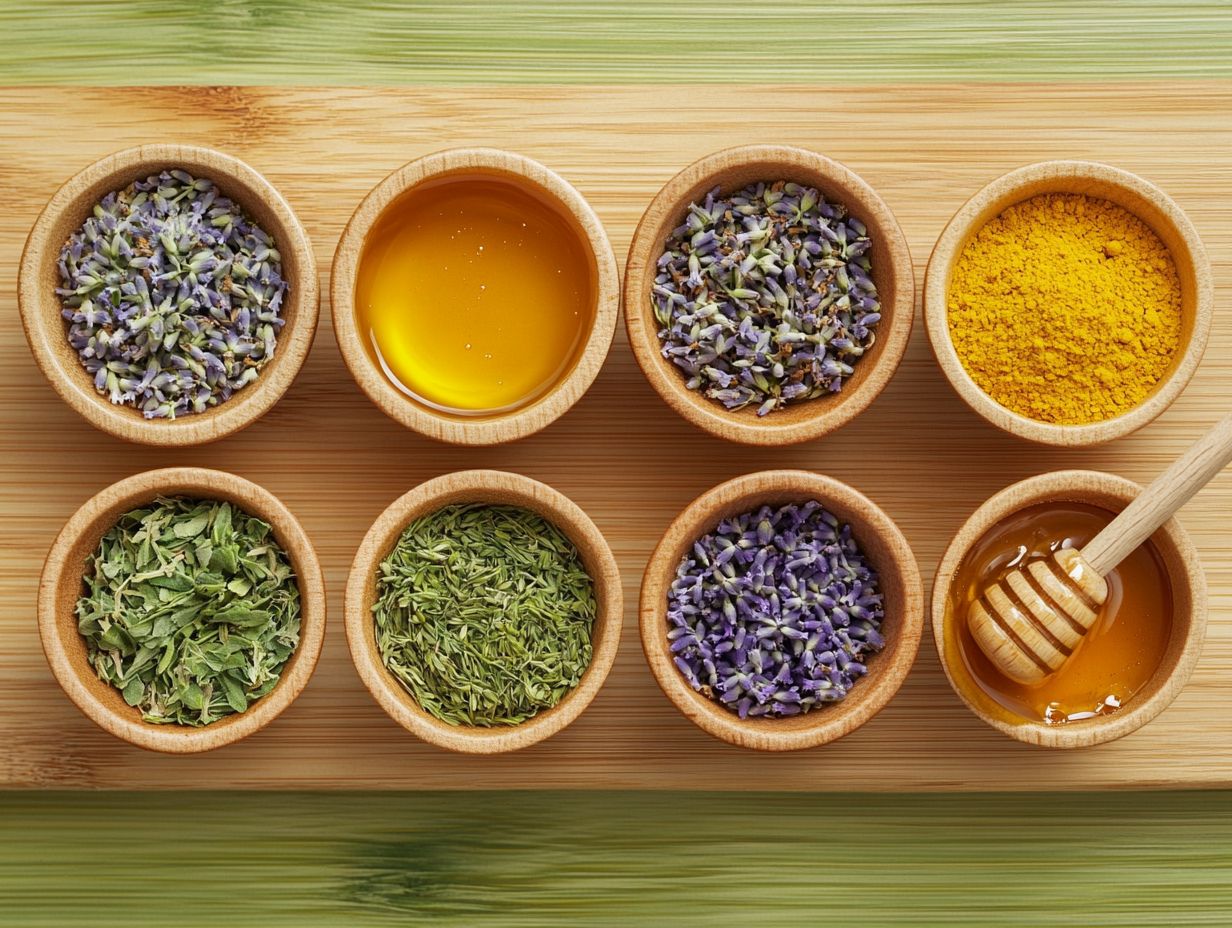
- What are the 5 herbal solutions for skin conditions?
The 5 herbal solutions are aloe vera, chamomile, turmeric, tea tree oil, and calendula. - How does aloe vera help with skin conditions?
Aloe vera has anti-inflammatory and antibacterial properties, making it effective in treating acne, psoriasis, and eczema. It also soothes and moisturizes the skin. - Can chamomile be used for all skin types?
Yes, chamomile is gentle and suitable for all skin types. It calms and soothes irritated skin, reduces redness, and promotes healing. - What makes turmeric beneficial for skin conditions?
Turmeric contains curcumin, a compound with anti-inflammatory and antioxidant properties. It can improve skin conditions like psoriasis, eczema, and acne. - Is tea tree oil safe to use on the skin?
Tea tree oil is generally safe but should always be diluted with a carrier oil before applying. It has antiseptic and anti-inflammatory properties that can help with acne, eczema, and other skin conditions. - How does calendula help with skin conditions?
Calendula has anti-inflammatory, antimicrobial, and wound-healing properties. It treats various skin conditions, including eczema, psoriasis, and dermatitis, while soothing and hydrating the skin.

